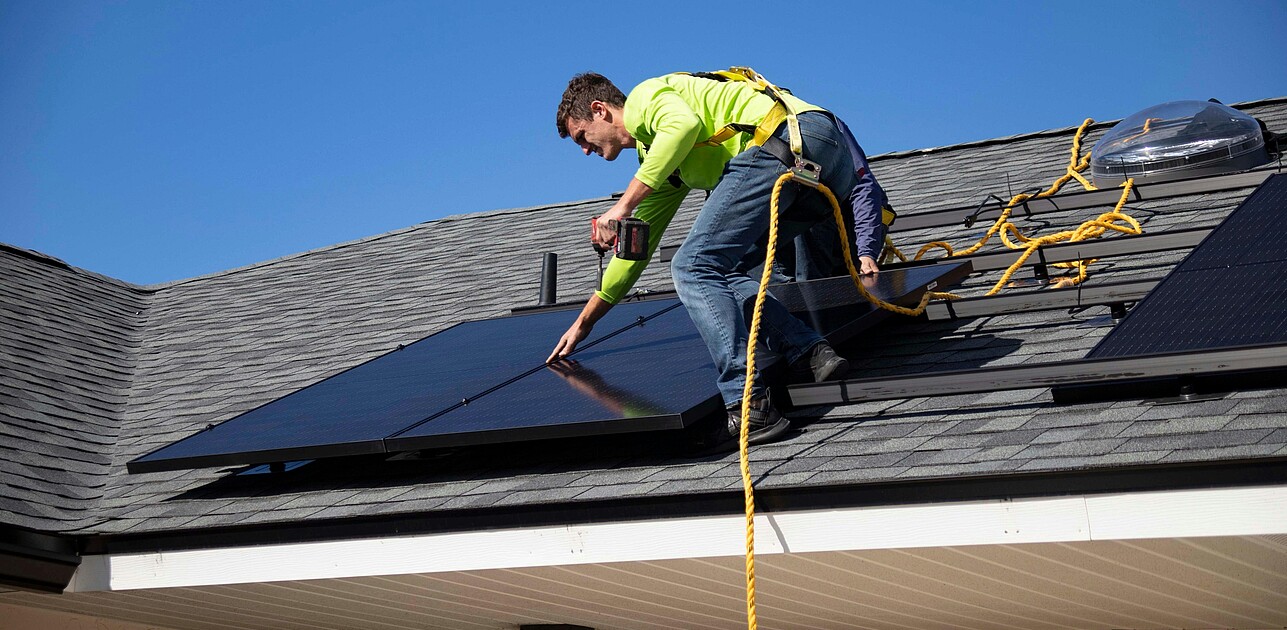

Article: Thursday, 18 January 2024
Focusing on the financial benefits of solar panels could increase the number of homeowners committing to adopting them, in spite of the often large price tag. This was found in research, Message framing to promote solar panels, just published in the journal Nature Communications, carried out by Prof. Ting Li of Rotterdam School of Management, Erasmus University (RSM), with Dominik Bär and Prof. Stefan Feuerriegel of Ludwig-Maximilians-Universität München, and Prof. Markus Weinmann of the University of Cologne.
What the researchers found could be useful for businesses in the green technology or renewable energy sectors to optimise marketing strategies to highlight the cost savings customers can achieve with solar panels or other green technologies. As well as encouraging more customers to commit to solar panels, the research explains customers’ actual behaviour, which is more useful than merely gauging customers’ intent. It describes steps that drive real customer commitment instead of just positive intentions.<o:p></o:p>
Understanding that solar panels have a complex decision-making process is useful for businesses. They can use our insights to optimise their sales funnels and find ways to make this process for consumers as seamless and compelling as possible
The researchers investigated the effectiveness of different ways of framing the messages about solar panels, which foster the use of clean energy. The relatively large investment required to instal solar panels has been a barrier to their use on domestic properties.
The researchers were able to show that the way the message is presented can significantly increase the number of customers committing to adopting solar panels. They gathered empirical evidence from a large randomized controlled trial (with more than 26,000 participants) with a nationwide online retailer in the Netherlands, using its website to test their messages and gauging customers’ responses.
Four different messages to promote purchasing solar panels were trialled:
All four messages were effective to some extent – the researchers observed a higher rate of customers committing to solar panels compared to the baseline. But the message that presented cost savings for the homeowner was by far the most effective, resulting in a 40 per cent higher level of commitment than the baseline, and 30 per cent higher than the average of the other three messages, which all scored about the same.
“Contrary to expectations, we found that framing the decision as a personal financial benefit, specifically through cost savings, was significantly more effective than highlighting environmental advantages. This outcome challenges the assumption that pro-environmental concerns are the primary drivers of investment in green technologies like solar panels.
“This surprising finding highlights the importance of personal economic incentives in driving decisions for large-scale green investments, over environmental motivations. Our results show that message framing is cost-efficient and scalable among retail consumers for promoting large-scale investments in green technologies and thus clean energy,” commented Prof. Ting Li.
The outcome of this research – how to make more effective messages about solar panels – should help increase the number of homeowners installing them. Even this small step towards adopting renewable energy is progress towards limiting the global temperature increase to 1.5°C above pre-industrial levels in the UN's Paris Agreement – to achieve this, a significant portion of electricity generation must come from renewable sources.
“While some countries have implemented policies with financial incentives to promote solar panels, these can be costly. We wanted to find cost-efficient alternatives to promote green technologies, specifically solar panels, through behavioural interventions,” commented Ting Li. “By understanding which messaging strategies work best, more consumers can be nudged towards making environmentally responsible choices, leading to a larger-scale transition to renewable energy sources.
“Our research contributes to the understanding of consumer behaviour in the context of green technology adoption and suggests that while environmental awareness is valuable, financial considerations often play a more decisive role in such investment decisions.”
In short, the researchers found:
Behavioural interventions, particularly message framing, can effectively promote the adoption of solar panels without relying on costly financial incentives.
Messages emphasising financial savings for the individual were the most effective in encouraging a commitment to adopting solar panels.
While people might express intent or positive sentiments towards green technologies, there is an ‘intention-behaviour gap’ so it's essential to focus on strategies that promote actual commitment and action.
Solar panel adoption requires detailed planning and is a high-stakes decision for consumers, emphasising the need for businesses to make the decision-making and planning process straightforward and appealing.
Large-scale investments like solar panels have different behavioural dynamics to low-cost or repeated behaviours, making it vital to tailor interventions appropriately.

The paper has been published in Nature Communications under the title Message framing to promote solar panels


Science Communication and Media Officer

Corporate Communications & PR Manager
Rotterdam School of Management, Erasmus University (RSM) is one of Europe’s top-ranked business schools. RSM provides ground-breaking research and education furthering excellence in all aspects of management and is based in the international port city of Rotterdam – a vital nexus of business, logistics and trade. RSM’s primary focus is on developing business leaders with international careers who can become a force for positive change by carrying their innovative mindset into a sustainable future. Our first-class range of bachelor, master, MBA, PhD and executive programmes encourage them to become to become critical, creative, caring and collaborative thinkers and doers.
